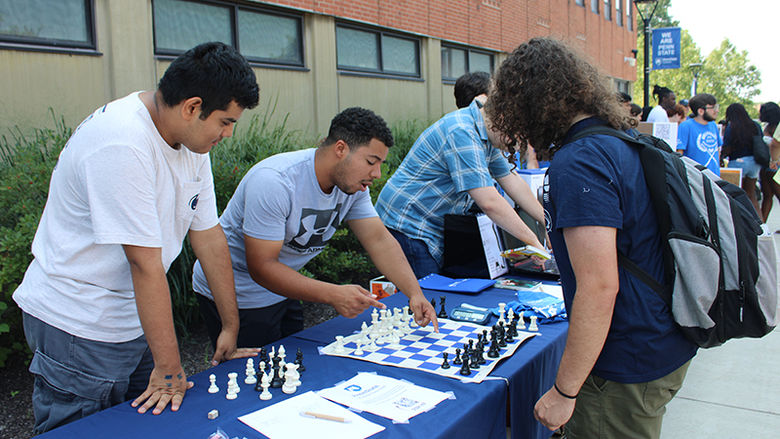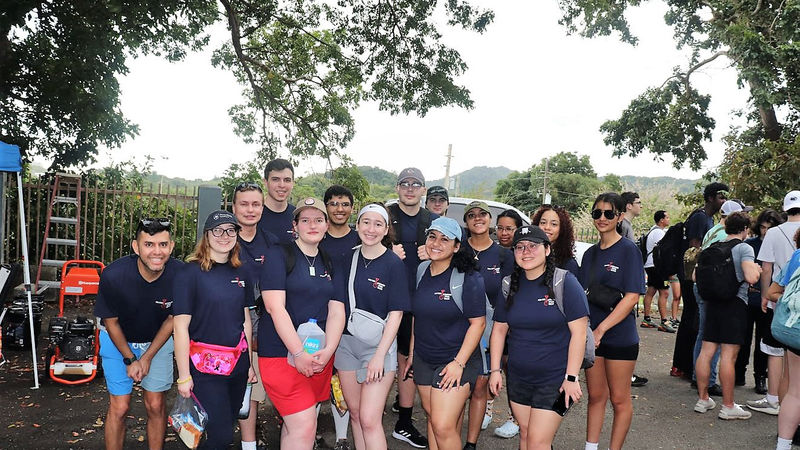

This dialog contains the full navigation menu for this site.

DUNMORE, Pa. – Over 20 Penn State Scranton students, faculty and staff members traveled to Puerto Rico during Penn State’s Spring Break week in early March – but it wasn’t for a tropical fun-filled vacation at a seaside resort. Instead, the group embarked on an “alternative spring break” service trip, traveling 1,700 miles to Luquillo, Puerto Rico, to provide disaster relief to residents whose homes were damaged by devastating hurricanes.
After spending a week together serving those in need, meeting the impacted families, learning about the culture and exploring the land, the students all agreed that the trip was “eye-opening.”
Fifth-year human development and family studies major Deymeliz Desarden-Ruperto is a native of Puerto Rico and said going back to do service in her home country had an even greater impact.
“For me personally, I felt like I was going to cry once we officially landed because it’s my home country,” she said, not having been able to visit Puerto Rico in the last six years.
“Since we traveled to the other side of Puerto Rico, not all my family could come and visit, but I felt a lot of nostalgia being there, of missing home. I felt relief when we arrived, and sad when we left, in my case. I was so happy to have the chance to do service in my home country.”
Other students who were first timers in Puerto Rico enjoyed the warm weather and beautiful scenery there, including the trees and mountains, along with experiencing the culture.
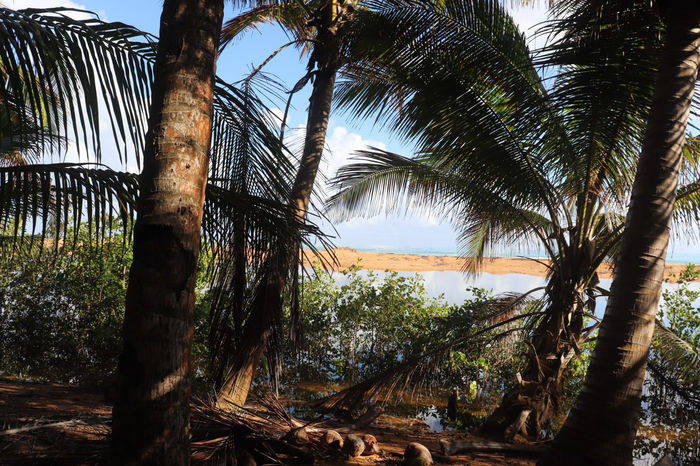
Despite all the damage they saw on their trip, students also got to experience some of Puerto Rico's natural beauty.
“I think we all got to experience how the culture was, and I think we were all very fortunate to experience that, such as how the community and the people are, so that was very beautiful overall,” Celeste Juarez, a second-year business and accounting major, said.
Juarez discussed the comfort she felt being able to speak in her native tongue.
“I grew up speaking Spanish fluently – in a majority of the places out there, people spoke Spanish. I was everyone’s little translator out there and thought it was really nice,” Juarez said. “Sometimes (in the U.S.), you face racism because people often expect you to only speak English, so it was really nice to go there and communicate to someone with no one saying anything negative. It was really nice being able to speak Spanish for a while.”
Lynette Guaba, a fourth-year psychology major, feels the same as Juarez.
“It was much easier for me to understand the native tongue and get around because I spoke Spanish and had conversations with the people on the island,” Guaba said. “I felt comfortable, free, without being judged. I felt accepted on an island that I could not call mine but felt like it was mine almost.”
Coordinator of Student Activities Nicole Paolicelli, one of the staff chaperones on the trip, said learning more about the students who participated in the alternative spring break trip was inspiring to her.
“I think everyone got to experience their strengths at some point during the trip, as well as feeling certain lows of exhaustion and sunburn. For me, as the adviser of the group, it was really awesome,” she said. “I told the students during our reflections that I was not a student who chose to go on Alternative Spring Break during my time (at Penn State Scranton). So, they have all inspired me in a different way than maybe I would have felt a few years ago. We all did such amazing things for the community.”
One of the biggest highlights for Paolicelli was hiking to the top of an observation tower in the rain forest.
“I think that was a struggle for everyone to get up there and make it. We were told that it was only going to be a 2.5-mile hike, which was not the case,” she said with a chuckle. “I had never gone on an extensive hike before in my entire life, so to see how we all pushed ourselves to get to the top that day was such an amazing moment. Our experiences were so robust, and it was so amazing.”
Students agreed that they all had pushed themselves past so many limits, which is something they have all learned about themselves.
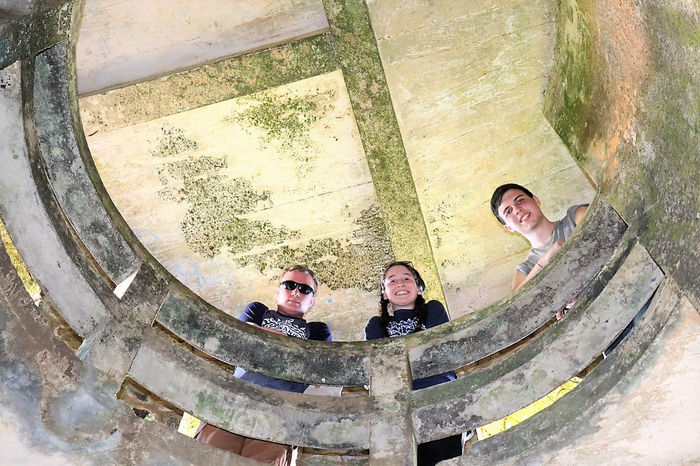
It wasn't all work -- the students did get to break away from their volunteer duties to go to sites, such as this bell tower, and see some of the beauty and history of the area of Puerto Rico they were in.
“I am stronger than I imagined,” Juarez said. We went through a lot of hardships but we were all capable of pushing through.”
Each student had their own favorite memory, but all who went agreed that spending time together and learning more about each other helped energize them when times were challenging.
Students from two other Commonwealth Campuses – Penn State Altoona and Penn State York, who participated in the Alternative Spring Break, joined up with Penn State Scranton students in Puerto Rico.
Although they did not have too many work activities to do together, Scranton students said that getting to live with them, eat dinner and play games in their down time, was a great way to build connections with other Penn Staters, and they enjoyed the experience.
“It was nice getting to know new faces and building relationships from that,” said Guaba. “They were super friendly, and we discussed different opportunities our schools offered, but we also discussed the many similarities our schools offered.”
Ashley Torres, a third-year psychology major, said as the days went on, their relationship with the other Penn Staters grew.
“I think how connected we all were during the whole trip – it was really about all the people who went, and not just the service activities, that made it so good. I think we all may be laughing about the crazy UNO game nights. We were always sitting together and working hard together and getting to explore together,” Parkston Myers, third-year IST design and development major, recounted.
“The support system helped get through the low moments. We all became a family out there which really helped me get out of those lows,” said third-year nursing student Olivia Maikranz. “It was nice being able to turn towards anyone and knowing that they are there willing to help you.”
While many students have done service activities closer to home within their local community, it was more rewarding for them to see a different perspective by helping make an impact in another, much different community for those in need in Puerto Rico.
“It’s one thing when were home in Scranton and serving at local food banks and things of that nature, but to be in a tropical rain forest clearing coconuts off the ground floor so that the land can be used for ecological purposes and not be turned into a Hilton hotel, it feels differently knowing there is a grander goal,” second-year financial services major David Stoshick said.
“The work was really rewarding. We had a lot of opportunities to talk to the people we were volunteering for and explore the surrounding areas,” Myers said.
“This trip really changed my perspective because we not only were able to do service, but we were also able to get to know the people and struggles they are facing. It made me think of how we can improve ourselves to better help this community in the future,” Desarden-Ruperto said. “For me, a lot of the people there inspired me to keep on going and to not give up.”
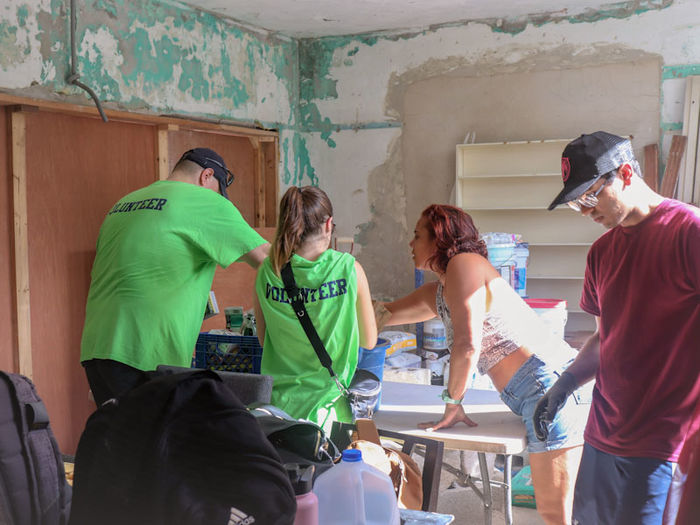
Students helped make repairs and improvements to homes ravaged by hurricanes in Puerto Rico.
Adult transfer student and retired army veteran Jayson Zimmerman said that while he had been on deployments to places that were not so fun, this Alternative Spring Break trip was service on a whole new level.
“We were helping fellow citizens of the United States, but at the same time, their rights are not even the same as what ours are,” Zimmerman said, explaining how the people they were helping told him that they cannot even vote for the president, even though they are United States citizens.
“So I think for us, being able to help them as fellow Americans who are struggling more than we are, was really symbolic to us,” Zimmerman said. “The people that we worked with genuinely showed their appreciation for us every single day as we were out doing all sorts of different things, which I think was even more rewarding in and of itself.”
“It was a different kind of volunteer service activity because they couldn’t get as many volunteers in their own country and they relied on college students to come down during spring break to provide help, which helped make even more of an impact,” Myers said.
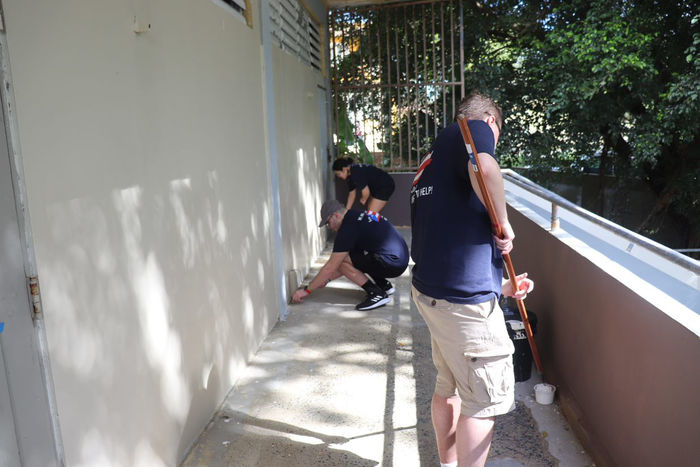
Students worked long days painting and sprucing up the outsides of buildings as well as the insides.
Getting to listen to the people they were serving was another core memory for some students.
“They were all locals, and they were telling us stories of what it’s really like to live in Puerto Rico and what really happens, compared to what we typically see on social media and on TV,” said Torres. “I think the perspective from a local’s eye is very different from a tourist’s eye, which was very eye opening in that sense.”
Torres recalled on a memory of a man named Leo that the students had met when they first arrived to paint a community home.
“In the very beginning of the week, he had us repeat affirmations, such as ‘we are changemakers, we are making in a difference, and we are a family.’ That stuck with me because when we got there, they didn’t know us, but they welcomed us with open arms and accepted us, which I think made us become like a family so quickly,” Torres said. “The people we were volunteering for definitely noticed that too, which was nice and uplifting.”
Rhiannon Depew, second-year psychology major, agrees.
“These people let us into their homes. While for some of the people it was more direct, at other times, it was more symbolic,” Depew said. “The fact that they all trusted us to help them try to make it better was very emotional. You really feel connected to these people who showed us their vulnerabilities which was a very connecting experience.”
The students all agreed that the Alternative Spring Break trip would not have been possible if they were not Penn State students, and they all felt a sense of pride knowing the leaders they are shaping into throughout this experience.
“It’s all the small things you do during your life, especially throughout our Penn State experience that add up to one big thing,” Depew said, reflecting upon the service trip.
“It is quite nice to see us promoting the Penn State name. I think in any city, state, country or continent you go to, you’ll always find someone who knows what Penn State is,” Stoshick said. “And immediately I think that most people often think of football, a huge school and academic programs, but I think what I enjoyed so much about being there and a Penn Stater, is showing other communities that we are there for them – we are hard workers and we want everybody to succeed everywhere. We want to do good in the world, both in Pennsylvania and abroad,” Stoshick said.
One of the most important takeaways for the students who did the alternative spring break trip was to not take the simple things in life for granted.
“The things we complain about here are so miniscule compared to the other things that people have to live through,” Torres said, explaining how people often complain about not finding a parking space, when there are bigger problems in the world, such as being homeless or living in not-so-great conditions.
“Coming back from this trip has given me such a positive mindset about so many things. A lot of them didn’t have much, but were so grateful for the little things they did have. They were all so proactive on making changes, and that’s what I carried back with me from this trip.” Torres said.
Matthew Reyes, a second-year business major, reflected on a moment that struck him on the trip when he was watching a man with a broken wrist make bunkbeds for endless hours. “He had a smile on his face the whole time and was not complaining,” Reyes said. “He was such a hard worker, and I really admired him for that.”
Penn State Scranton Disabilities Services Specialist Matthew Smith, another staff chaperone on the trip, was grateful to have been part of the experience.
“We could be working on a house which had no ceiling, or helping someone build a garden, when the next-door neighbor has no roof,” said Smith. “You walk down to the most beautiful beach you have ever seen but then you notice a house there that is caving in. It is so unbelievable and it’s hard to process over time, but it really just makes you want to do more.”
Serving for the future
The Alternative Spring Break trip impacted all the students, providing a variety of valuable life lessons and inspiring them to continue to serve both locally and abroad. As a result, Paolicelli said a long-term goal is to create more trips like the Alternative Spring Break option to give students the ability to participate in more service opportunities.
Robert Salvestrini, a second-year mechanical engineering student, recalled a memory when someone asked the group how many of them volunteer at home. “Not a lot of people raised their hands, and it was eye opening to see that even though we were helping this community, we can also do a lot more back at home and elsewhere. Help is needed all over,” Salvestrini said.
For Torres, learning about the education system in Puerto Rico encouraged her to want to go back and do more for that community.
“I want to be a school psychologist, and knowing the lack of resources students with disabilities face out there, is another reason why I want to go back to help this community,” she said. “There is no reason these kids should have to leave their home to get an education.”
Although the Alternative Spring Break wasn’t a luxurious vacation trip, for Zimmerman, it was more than he could have imagined.
“I think we had a much better time and were treated so much better than any hotel or resort could have given us,” Zimmerman said. “I am just so glad I did not take a cruise to Puerto Rico. I got to see the real Puerto Rico.”
Stoshick said the Alternative Spring Break made him realize how much he loves helping people.
“The world needs leaders who can create change in their own communities and abroad. I think it was very inspiring to see everyone’s work that was done here at home and how nicely it transferred to a different community just as big, and make an even bigger impact,” he said. “It definitely motivates me to keep continuing to do the amazing work that I do in my own community and to hopefully continue to do it abroad.”
The trip has also inspired Guaba.
“There is much more to life than being home and being lazy, than just school and going to work. There are people out there that work to better their community, create a better future for future generations; there are people who work because they are passionate about their job and their community; there are people who volunteer because they actually care to help and want to make this a better world,” Guaba said. “There is more to life than just working to make money and live a better life. There is a life full of happiness, positive experiences, good moments in the bad moments, there is joy and dedication to what drives you every day, and life satisfaction that help drive you every day, define you and bring on motivation.”
Prior to taking this trip, the students all admitted that they had not known much at all about each other, but after spending a week together, they now feel like a family. Torres only knew one person in the group before joining the group in Puerto Rico.
“I think that’s one of the reasons I went because it was out of my comfort zone,” Torres said. “It was a way to meet people that I don’t think I would have met otherwise because they’re not involved in the same clubs and major that I’m involved in. We were all stuck on an island together so there was no way of getting out of meeting new people, which was very exciting in that sense.”
Guaba joined the trip because she wanted to get out of her comfort zone and “be a part of something that my school is able to offer students so they can learn to take on leadership in the world one day. I wanted to attend this trip because I wanted to make something great out of myself. I wanted to invest my time in something worthwhile, I wanted to help my Hispanic community as a Hispanic. I wanted to represent my community, represent myself as a leader and bring about social change.”
Having completed the trip, Myers wants others to know it’s definitely something they should take take part in if they can. “For anyone who is looking to do Alternative Spring Break next time, say ‘yes,’ to it all – the adventures, service, and meeting new people,” Myers said. “Get out of your comfort zone!”
